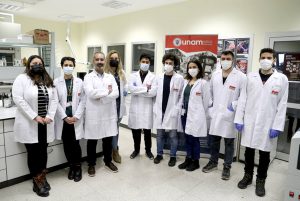 A team led by Asst. Prof. Fatih İnci at the Bilkent University National Nanotechnology Research Center (UNAM) is developing nanotechnology-based “laboratories” that can diagnose various diseases, including cancer and other serious disorders, in 15 minutes. The team has designed a smart chip, made using domestically produced materials, that can be employed to analyze a drop of blood or other bodily fluid placed on top of a sensor contained in the chip.
A team led by Asst. Prof. Fatih İnci at the Bilkent University National Nanotechnology Research Center (UNAM) is developing nanotechnology-based “laboratories” that can diagnose various diseases, including cancer and other serious disorders, in 15 minutes. The team has designed a smart chip, made using domestically produced materials, that can be employed to analyze a drop of blood or other bodily fluid placed on top of a sensor contained in the chip.
Describing the potential of these miniature labs, Dr. İnci stated, “With these chips, we will develop platforms that people can implement on their own – even in small villages lacking medical resources – and they can provide a unique connection between doctors, nurses and patients using mobile phone integration.” He compared the system, in its simplicity of use and rapidity of results, to the glucose meters that diabetics have been using at home for decades.
The team designed the chips as semiconductors that they produced themselves, using inexpensive waste plastics. In the chips, explained Dr. İnci, “we are aiming to re-create the environment of the cells, proteins and viruses that are in bodily fluids like blood, urine, saliva and sweat, and make biomarkers into a chip to be used in diagnosis.”
The concept requires that only one drop of blood or other fluid be placed inside the chip and left for 5 to 10 minutes. Real-time data can then be received by inserting the chip directly into a palm-sized reader. The next stage is to integrate this system with mobile phones and the cloud, making it possible for clinicians and scientists around the world to consult with each other on diagnoses, within the bounds of ethical standards.
Applications and investigations that the research team is working on include early detection of cancer and deciphering disease biomarkers of cancer cells; the use of urinalysis to study kidney injury/failure; and the development of platforms that will provide continuous monitoring of disease biomarkers using Band-Aid-sized devices that collect sweat samples.
The researchers have completed their preclinical studies, and are currently in the trial phase of working with patient samples. Dr. İnci expects that this phase will be complete in the next year or two, with patenting and production to follow.
The UNAM team is collaborating with the Hacettepe University Faculty of Medicine for clinical research and with Hacettepe University, Sabancı University and Fırat University on biosensors. The team is also involved in joint studies of various related issues with investigators in Brazil, China, Finland, Germany and the USA.
